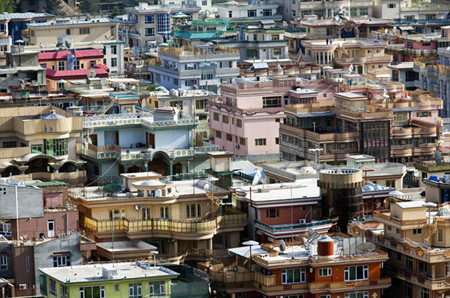By Jerome Starkey
If it weren't for the tank traps and grey blast-walls, the extravagant mansions in Kabul's most expensive neighbourhood would not look out of place in a fairytale.
Ornately gilded pillars hold up pastel-hued balconies; brightly coloured domes crown mosaic walls made of mirrored tiles.
Yet Sherpur district, which 130 years ago hosted General Frederick Roberts's cantonment during the Second AngloAfghan war, is anything but magical.
Most of the homes were built by Afghanistan's corrupt political elite on land stolen from the poor and the state in 2003.
While some in the international community objected, others, including mercenaries, embassies, the UN and television journalists, scrambled to pay tens of thousands of dollars in rent, and moved in.
Since then, the massive concrete homes have become a symbol of the corruption within President Karzai's regime and of the Western money which fuelled it.
"Every time I pass by I feel like the buildings are laughing at me," said Nader Naderi, the spokesman for the Afghanistan Independent Human Rights Commission who led an outcry in 2003 when warlords first sent in the bulldozers to evict the refugee families living there.

"Poppy Palaces" in Kabul. A symbol of the corruption within President Hamid Karzai's regime. (Photo: Benjamin Lowy / VII Network)
"Those who commit crimes, particularly the powerful against the poor, they feel immune. These are unique symbols of impunity."
However, as the tide of Western money starts to recede, the fairytale houses, known as "poppy palaces" because of the suspicion that they were built with the proceeds of opium smuggling, are suffering a distinctly real-world price crash.
Owners and estate agents interviewed by The Times said that house prices had plunged by up to 40 per cent in the past six months and rents in some cases had dropped even faster.
Dozens of homes are empty.
Some blame President Obama's announcement in June that American troops would start withdrawing this year.
Others point to President Karzai's decision to drive private security companies out of the city centre. Most spoke nostalgically of "money-is-no-object" tenants, who billed eye-watering rents straight back to the United States Agency for International Development (USAID) before its budget was slashed this year.
Richard Scarth, a British chartered surveyor who part-owns a property company in Kabul, said rents were softening, but insisted that "good quality poppy palaces are still in demand". Sales had stalled while landowners "wait and see", he said.
The rent for one 14-bedroom house had dropped from dollars $18,000 a month to $9000.
Another, with 20 bedrooms and 11 bathrooms, chandeliers and an underground saferoom, had been vacant for five months and had fallen from $16,000 a month to $10,000.
"You would have powerful neighbours," said the estate agent Feda Mohammed as he pointed over the razor wire and the sniper screens crowning another compound's 3m walls.
"That is the Ministry of Interior's house; he has lots of guards. There is an American construction company and that's the Spanish Embassy."
About 160 families who survived the landgrab still live in simple mud homes in Sherpur, but the Government has refused to give them official title deeds, according to Sayed Mohammad, a local elder.
"It hasn't happened quickly because we refuse to pay any bribes," he said.
One resident, Abdul Ghayu, said his family was constantly harassed by a senior general in the Ministry of Interior.
"He is part of the land mafia, he is rich and powerful, but God willing, we will resist him," he said.
Others are less optimistic. "If the foreigners leave, the warlords will just take our land," said Mohammad Gul, a shopkeeper. "Otherwise the Taliban will come back and the fighting will start again."



